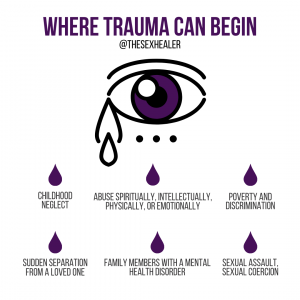When Is Porn Cheating? Identifying Porn Use That Crosses the Line
When Is Porn Cheating? Identifying Porn Use That Crosses the Line
Ooh, when someone asked me “is porn cheating” the other day, I thought “this is a touchy subject.”
In the past ten years, I have seen this as one of most gender-divided topics that other-sex couples struggle with everywhere, and one that same-sex couples often disagree on.
Does looking at porn constitutes infidelity or cheating?
Views on pornography are all over the place. It’s still a relatively new phenomenon in our society to have access to this material from any place at any time.
Before the internet, pornography was relegated to dimly lit adult stores, hidden in homes, or inside magazines. There was much more stigma around porn, and it was regulated.
These days, pornography is everywhere. Any barrier to viewing and using porn is simply a formality.
Knowing this, you have to understand that you and your partner will be exposed to more pornography than ever before. It’s a fact we all have to deal with today.
How you view the use of porn will depend on your upbringing, religion, your views on the industry and also how you feel it affects the intimate relationship with your partner.
As usual, avoiding absolutes and working with your partner, with the help of a therapist if necessary, can help you both arrive at a place of love and understanding when it comes to porn.
Avoid Porn Shaming
On average, women are around two times more likely than men to report that they never use porn. It’s probably easy for people to understand why porn use is higher among men, yet that doesn’t mean women don’t view and enjoy pornography.
Let me just say it. Your partner has, is, or will likely use pornography at some point during their life.
Realizing that now before you come across it on their phone or computer will save you some heartache when it happens. Any person that says they have not ever seen any pornography may be lying.
Knowing that there are a majority of individuals who have viewed porn at some point should deter you from taking a stern approach if you’re unsettled about your partner’s porn use.
You may ask “is porn cheating?” and I would say that irregardless, the worst thing you can do is use shame as a motivator to try and change your partner’s behavior.
That’s true with porn and just about every other scenario.
An understanding approach to dealing with pornography in a committed relationship or marriage will help both of you to be open and honest, as well as find a solution that hopefully works and contributes to trust between you.
Even if there are bigger issues like porn compulsion, shame is not the way to get someone to change.
Do You REALLY Want to Know?
Don’t kid yourself about how you’ll feel when you find out what your partner is doing while you’re not looking. If you want to know what’s going on, you’re likely going to be surprised at how often your partner uses porn, much less what they are into online.
A lot of individuals approach watching porn online as a fun, stress-relieving activity.
They might even be curious at times, searching for some far-out fantasy they have or a certain type of porn that’s not something the two of you have played around with in your intimacy.
How are you going to react if you discover your partner is really into watching threesome videos or bondage porn?
DO NOT jump to conclusions thinking your partner is unhappy or that their porn viewing habits mean that they are unsatisfied with you. Because, that’s usually not the case.
It’s fine if you want to have an open conversation about porn with your partner, just be prepared for if, and that’s a BIG if, they’re completely forthcoming.
When Porn Use Crosses the Line
Just like with many other things in a committed relationship, porn use crosses the line when it involves deception.
Omitting the truth about porn use can be a red flag. Not being truthful can lead to a slippery slope. It can push the boundaries of what one partner is willing to keep from the other.
We’re not talking about saying you watch porn “a few times a week,” when in fact it’s every day.
When taken to extremes, omissions of truth can help people justify hiding things like affairs or irresponsible financial decisions that impact both parts of a couple and the family system.
Therapists deal regularly with people who are opposed to pornography for religious beliefs and other ideologies. For some people, it’s a redline that if crossed means a major betrayal of trust.
That shouldn’t be taken lightly.
It’s hugely disruptive when you enter into a relationship with a common understanding that deteriorates over time.
Even outside of pornography, imagine discovering your partner doing something both of you vowed to avoid when you committed to each other in the beginning.
What if you’re against drug use and you find out that your partner loves smoking weed? Would it be a dealbreaker?
What if you thought your partner was satisfied, but really they have been faking orgasms with you a majority of the relationship? Would that justify a betrayal?
So, Is Porn Cheating?
Porn is cheating when you’re actively hiding it from your partner. That means viewing it after you’ve told them you wouldn’t or when you hide it from them, so they don’t even THINK about needing to ask.
Cheating doesn’t always mean you’ve slept with someone else without permission.
It means you violated the trust in your relationship and cheated on the spoken and non-verbal guidelines that are the foundation of the bond you have. It’s also a major issue if it takes away from your intimacy.
Open Communication Is Crucial
Our partners can be sensitive to our porn use, because of moral beliefs or finding out you’re looking at porn triggers insecurities in them.
Am I not enough for you? What is it about me that isn’t filling that sexual hunger? If my partner is watching porn, will it eventually lead to an affair?
These concerns are not only legitimate, but doubly so if you or your partner are deceitful about pornography habits.
The solution to porn use, and most other relationship challenges, is open communication and honesty. Laying out the vulnerable parts of you on the table and finding a way to be on the same team and find a win together!
If you’re a porn user, don’t hide it.
You don’t need to report every time you look at porn or masturbate, yet don’t project one image and then lead some sort of double life.
If your partner is using porn and you’re concerned about it, try to have an open mind. Don’t be quick to make ultimatums or create shame. That can make things worse. WAY WORSE!
Encourage each other to be honest and accepting. Collaboration is the real key here.
As you grow older and more mature in your relationship, hopefully fewer things will become real deal breakers, because you’ll realize we’re all human, and that comes with a lot of imperfection. However with imperfection and growth, there is potential for more beauty and greatness.
About Life Coaching and Therapy
Life Coaching and Therapy (LCAT) is a therapy and coaching practice that transforms our clients lives through our flexible. Multi-technique approach and pleasure-skills training provided by systematically-trained and licensed therapists!
Get to know our founder and owner, Amanda Pasciucco, (a.k.a. The Sex Healer) PhD, Licensed Marriage and Family Therapist (LMFT), and an AASECT Certified Sex Therapist (CST) that has developed innovative therapy programs and therapy videos that get results.
Our team of compassionate, licensed therapists and certified sex therapists help all clients who visit us for a variety of personal, relationship, intimacy and sex problems.
LCAT provides on-site appointments, as well as video chat and text therapy programs.
Learn more about how LCAT can help improve your life at What We Do.

























 Yellow in the middle to represent those who are not on the gender binary (e.g. non-binary people, gender fluid, etc.).
Yellow in the middle to represent those who are not on the gender binary (e.g. non-binary people, gender fluid, etc.). 

 High-intensity interval training exercise can have a wonderful way of clearing out our heads because we’re so focused on the task at hand.
High-intensity interval training exercise can have a wonderful way of clearing out our heads because we’re so focused on the task at hand.







